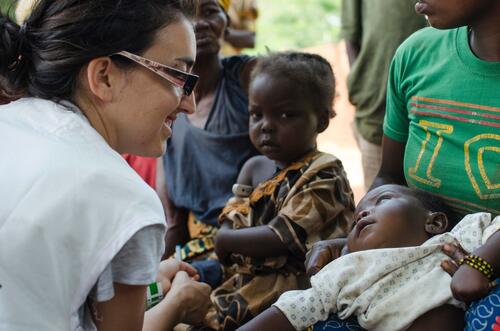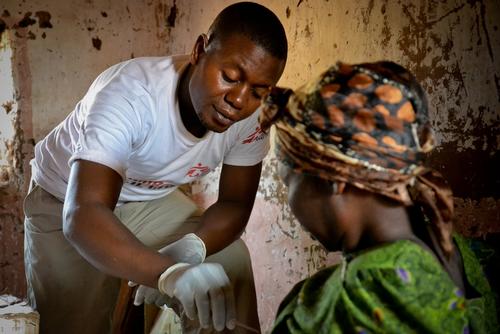Abiba is 35. She lives with over 500 other people, all Muslims, confined in the compound at Saint Martyr de l’Ouganda church in Carnot, a town in west Central African Republic (CAR).
25-year old Doudou is a member of the Fulani community. She cradles in her arms her younger daughter who’s only two and a half months old.
A few blankets, clothes and mats are scattered around the church floor. The displaced people living here in this safe haven haven’t got much. An MSF mobile clinic provides medical consultations every Thursday.
Before the ‘events’, Abiba was a shopkeeper. She speaks fluent French and Sango and rudimentary Arabic. She knows Carnot church’s compound only too well as this is where she’s lived since it all started in February 2014. That was when popular self-defence anti-Balaka militias began persecuting Central African Muslims who found themselves unwittingly associated with the enemy, former rebel coalition Seleka, who had also committed atrocities and acts of violence.
To Abiba and Doudou it seems as if it was only yesterday that their lives were torn apart, that they escaped and sought shelter in this safe haven.
Doudou had to re-marry recently, to an older man. Her first husband ran away before the anti- Balaka arrived in Carnot. Left to fend for herself with her elder daughter, three years old at the time, they fled when armed men attacked and looted their home. Doudou had to get married again to survive, “what could I do without a husband and a family?” Doudou had no way of knowing when her second baby would arrive and Mariam came into the world on the church floor. Many of the women are unable to take care of their health, don’t know when to expect their period, don’t go to hospital or see a doctor, even when they’re pregnant. It was Abiba who asked MSF for help for Doudou and her new baby. Our teams gave them medical treatment before referring them to the hospital in Carnot.
Abiba is a mother too. “I was a Christian. I lived with my parents in the capital Bangui. That’s where I met Ahmet, a Muslim photographer. I converted to Islam out of love. We got married in Carnot and lived here with my husband’s family. Ahmet was known in the town. When the anti-Balaka militias arrived, they wanted to kill him so we ran away into the forest with our two little girls. That was when Ahmet found out that his little brother had been caught and tortured before they cut his throat, like an animal. And I lost my little girl. She was three months old. She wasn’t sick. She started crying, she wouldn’t stop and when she finally calmed down, she wasn’t breathing anymore.”
Abiba has been married to Ahmet for 17 years. Their ‘big’ girl is eight now. They live together in the Carnot enclave. “We’re like one big family. We support and look out for each other. I would really likely to have another baby, but it’s impossible here. We live on the bare earth and there’s no privacy. We had a good life before this happened. Now all I dream of is getting out of here and starting all over again.”
Aoudou is 28. He too lives in the Carnot enclave. “I lived with my grandmother in Carnot. I was born here. In February 2014, when the Selekas left, the anti-Balaka looted our house and took everything. My grandmother escaped to Chad, but I wanted to stay to keep an eye on our house. The MISCA peacekeeping forces found me and brought me and the other Muslims still in town to the compound.
When we first arrived, we all thought we’d be staying for just a few days, or several weeks at most. It’s been over a year now. We had no idea of what was ahead of us. We’ve lost more than our homes; we’ve lost our freedom. At the beginning, we couldn’t take a step outside the church door without getting attacked. Back then we were almost 2,000 and now we’re just over 500. Some people can go out to the mosque or the market, which are only a few metres away. I can go out too, because my mother was a Christian who converted to Islam and I still have Christian cousins in the town, but the minute I Ieave the compound, I really worry about my safety. There’s no question, the people here must be able to go back to their homes.
I’m all alone. I’ve got no money, I live alone, I’m living like a captive. I can’t get married. I earn a little money working as a casual worker for MSF but not enough to put any away. Armed men are everywhere in the town.
Our country is disintegrating and unemployment is going up. It’s only thanks to the aid organisations that we keep going. They hire young Central Africans to give them some prospects for the future, to steer them away from the conflict and weapons. Maybe this is how peace will be restored one day?
When it’s safe again, I’ll go to Bangui to finish my education. I would like to study economics, accountancy and management. And of course, I want to get married.”





